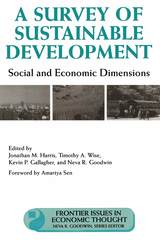
Download PDF of corrected version of Chapter 2The intrinsic links between economics and human rights has led some scholars and practitioners to affirm that if strategies of economic development and policies to implement human rights are united, they will reinforce one another and improve the human condition.
This book draws on the papers presented at the Nobel Symposium on The Right to Development and Human Rights in Development. Opening with an essay by Nobel Laureate Amartya Sen, the book contains chapters by experts in the fields of philosophy, economics, international law, and international relations on the conceptual underpinnings of development as a human right, the national dimensions of this right, and the role of international institutions. The contributors explore the meaning and practical implications of human rights-based approaches to economic development and ask what this relationship may add to our understanding and thinking about human and global development.

This volume explores the intersection of the scientific, clinical, and economic factors affecting the development of PPM, including its effects on the drug pipeline, on reimbursement of PPM diagnostics and treatments, and on funding of the requisite underlying research; and it examines recent empirical applications of PPM.

Perpetual economic growth is physically impossible on a planet with finite resources. Many concerned with humanity's future have focused on the concept of "sustainable development" as an alternative, as they seek means of achieving current economic and social goals without compromising the ability of future generations to meet their own goals. Sustainable development brings together elements of economics, public policy, sociology, ecology, resource management, and other related areas, and while the term has become quite popular, it is rarely defined, and even less often is it understood.
A Survey of Sustainable Development addresses that problem by bringing together in a single volume the most important works on sustainable human and economic development. It offers a broad overview of the subject, and gives the reader a quick and thorough guide to this highly diffuse topic. The volume offers ten sections on topics including:
- economic and social dimensions of sustainable development
- the North/South balance
- population and the demographic transition
- agriculture and renewable resources
- energy and materials use
- globalization and corporate responsibility
- local and national strategies
Each section is introduced with an essay by one of the volume editors that provides an overview of the subject and a summary of the mainstream literature, followed by two- to three-page abstracts of the most important articles or book chapters on the topic.
A Survey of Sustainable Development is the sixth and final volume in the Frontier Issues of Economic Thought series produced by the Global Development And Environment Institute at Tufts University. Each book brings together the most important articles and book chapters in a "frontier" area of economics where important new work is being done but has not yet been incorporated into the mainstream of economic study. The book is an essential reference for students and scholars concerned with economics, environmental studies, public policy and administration, international development, and a broad range of related fields.
READERS
Browse our collection.
PUBLISHERS
See BiblioVault's publisher services.
STUDENT SERVICES
Files for college accessibility offices.
UChicago Accessibility Resources
home | accessibility | search | about | contact us
BiblioVault ® 2001 - 2024
The University of Chicago Press









